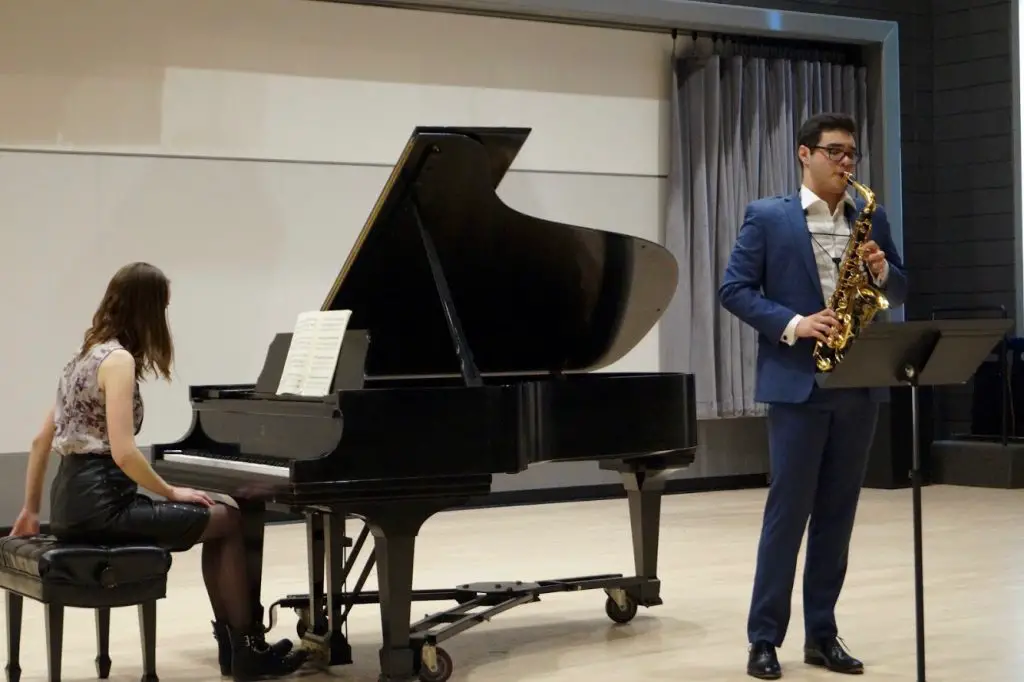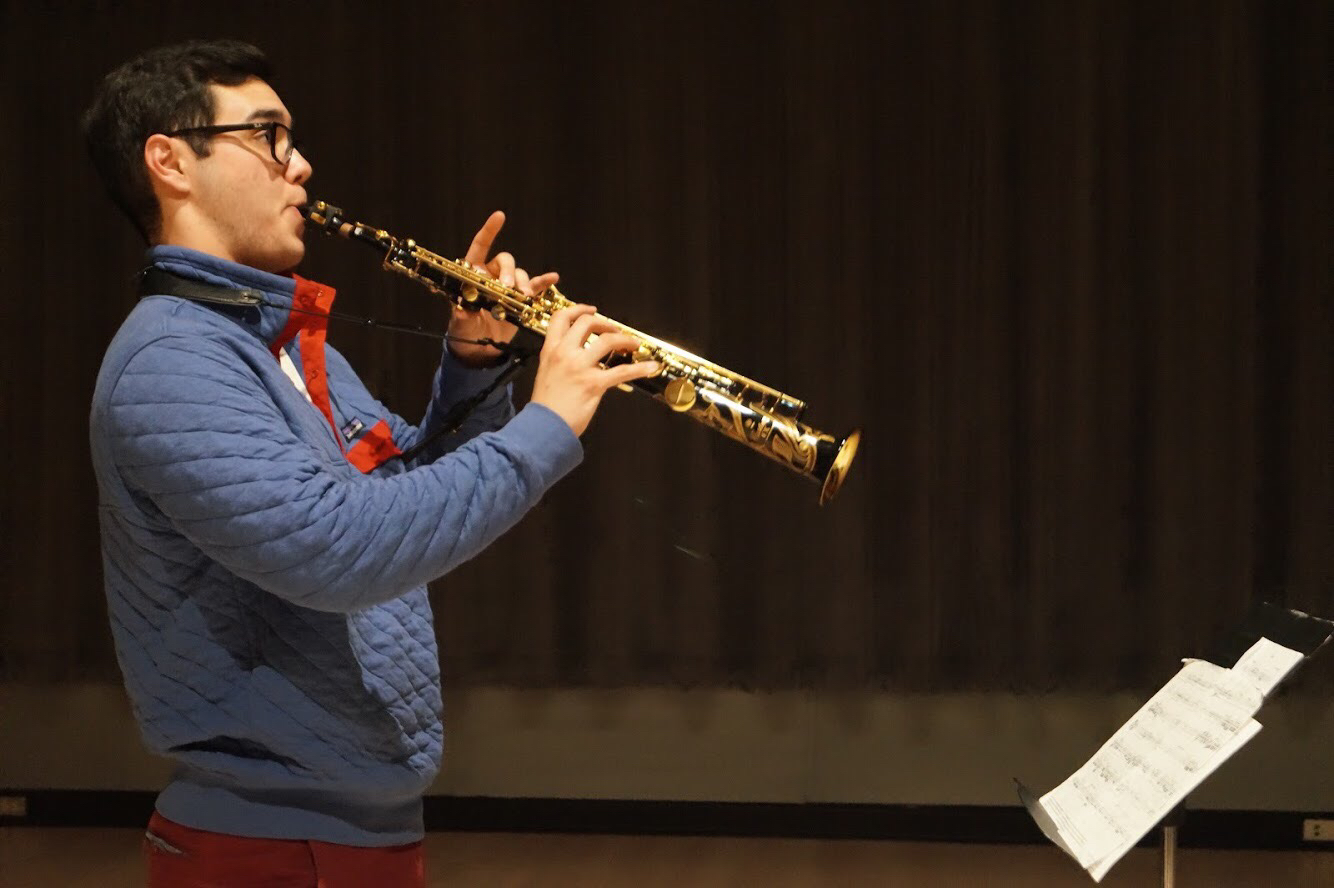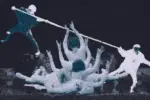As a junior, Chad Lilley already has an impressive resume, including a national tour and the title of Presidential Scholar in the Arts. Now Lilley attends the University of Michigan, where he studies saxophone performance and competes at an international level.
No matter how much time he spends on it, his love for music will never wear down, and he hopes to continue with a career in music for a very long time.
Kelly Keglovits: How did you first get introduced to music?
Chad Lilley: My dad works in the high fidelity audio business, so his whole career is based off audio stuff. What comes with that is that he has a huge appreciation for all kinds of music. When I was really young, back in Seattle, instead of doing that whole Saturday morning cartoon thing, he and I would just sit on the couch and listen to a record or the radio. He’s a huge jazz guy and that’s originally how I got into playing the sax, through the influence of my dad’s passion.
KK: When did you get into actually playing the saxophone?
CL: Going back to that memory of my dad and I sitting on that couch, there was one particular musician, Dave Brubeck, whose orchestra has a song called “Take Five,” which heavily features their saxophonist. It’s a really famous jazz track, and I remember, while I was probably in kindergarten, hearing it on the radio and having my dad sitting next to me.
I asked him what it was and he said, “Oh, it’s a saxophone.” He drew a picture of what the instrument looked like, and I still have it hanging in my room today. I told him that I wanted to be able to play “Take Five” for him one day. After, I couldn’t stop thinking about it until I got into the fourth grade, which is when they first allowed us to take instrumental music.

KK: Once you started playing, was it an instant click or did it take some work and time?
CL: I started in the fourth grade with basic band, and my band teacher saw something in me, but my mom is a very “put all your effort into something or don’t do it” type of person. She got really frustrated because she was spending all this money and wanted me to put work in that I wasn’t. My band director actually stopped her from pulling me out. Her husband was a professional saxophone player, and so she got me hooked up with him. I ended up studying with him all through middle and high school until college, and he was a huge impact on my life.
KK: Other than working with your band director’s husband, were there any other programs you did in high school to build on your career as a musician?
CL: Yes, absolutely. First off, I was involved in the competition circuit for soloists, which involved a lot of traveling, especially as I became an upperclassman in high school. I was lucky enough to be granted one of the saxophone spots in the National Youth Orchestra of the United States, a touring orchestra that allowed me to spend a month playing on a national circuit. We worked with amazing artists, like our conductor David Roberson, who is a Grammy award winning conductor, and Gil Shaham, who is one of the most prominent violinists alive.
Junior year I did a program called “From the Top!,” an NPR radio show and nonprofit that focuses on education and outreach whose entire goal is to feature young classical musicians across the country. I was granted a spot on NPR, went to Boston, filmed a live show and got interviewed; after, we did a bunch of pop up performances and outreach educational stuff for younger, more impoverished kids around the Boston area. “From the Top” was another program that has been a huge part of my musical career and networking, and I ended up working an internship for them after my senior year of high school.
I also applied to YoungArts and participated in their national program, which meant flying out to Miami, learning from distinguished teachers and putting on a performance. The program led to my nomination for another distinction that I received as a high school student, called the Presidential Scholars Program.
YoungArts is the sole nominator for the opportunity, but the process also entails several interviews as well as a giant application, and I was really fortunate to be one of the twenty arts scholars nationally recognized. We all went to DC and did a great show at the Kennedy Center about the genesis of life and how we, as individual artists, fit into the story of the human race. We also got to go to the White House and meet the president. It was one of those amazing experiences that you come out of as a different person.
KK: So what are you doing with music now at the University of Michigan?
CL: Coming to college is entirely different for music, as I’m sure it is for every other passion that people have. I am in a chamber ensemble with my saxophone quartet called Saffer. We do pop-up performances, outreach educational stuff and also compete and travel, so that takes up a lot of my time. I also do solo competitions and lots of learning. This summer I went to Europe for a national competition in the Swiss Alps. Competition is a huge part of what Saffer does.
KK: Is there a big competition that you work toward every year?
CL: Not everyone is going to be competing, but, speaking for myself, there is the biennial North American Saxophone Alliance competition. I placed second my freshman year and I am gearing up for that again this year. My quartet is preparing for other competitions as well. But yes, I would say for those who do compete, there are one or two events that you are really looking forward to, not even just in terms of monetary prizes, but just as relevance or opportunity.
The one that I recently was lucky enough to win in Switzerland, there isn’t even money involved. Instead, they are flying me back in March to put on a individual recital as a part of their chamber solo concert series, which is an opportunity and a resume builder. But it’s not 100 percent about the competitions. It kind of sounds like it is, but there is a lot more to it.
KK: What type of music do you play now?
CL: I am technically a classical musician. While most people think of jazz or rock or pop when they think of saxophone, it’s actually a really diverse instrument. I also do as much jazz as I can. There isn’t always a ton of time for it, but I started to play because of my initial jazz passion; I try to keep it up.
KK: What about after college? What would you like to do? Do you want to keep performing or do you have other plans?
CL: I am going to be in school for a while. I am planning on getting my doctorate in music, which involves four years of undergrad, a two-year master’s program and then a three-year program that’s called DMA (doctorate of musical arts), which is a partially research-based, partially performance-based degree. As a musician nowadays, it’s kind of tough to go into the field without a doctorate.
My end goal is to follow in the footsteps of my current professor, Dr. Timothy McAlester at University of Michigan. He is a Grammy award winning musician and also a huge advocate for classical saxophone as a viable instrument. I am really interested in becoming a university professor and kind of passing along what I’ve been handed down. I have a couple of private students right now and in some ways it teaches me a lot of things I didn’t know about my own playing. It’s also really great, to see “a-ha” moments on someone’s face that you helped inspire. I also still want to continue to perform, travel and do as much with my instrument as possible. That’s kind of a twenty-year plan I guess, but we will see how it all turns out.

















